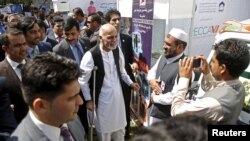Pakistan and Afghanistan held high-level talks Friday in Kabul in a bid to ease bilateral tensions over terrorism charges and explore ways to promote Afghan peace efforts.
No official details were released of the one-on-one interaction between Afghan President Ashraf Ghani and Pakistani national security adviser Sartaj Aziz.
The meeting on the sidelines of the sixth Regional Economic Cooperation Conference on Afghanistan, RECCA, took place amid Kabul's complaints that Islamabad has failed to take action against Taliban and insurgents linked to the Haqqani network and allegedly operating from the Pakistani side of the border.
Pakistani government sources said the “comprehensive” discussions between Ghani and Aziz lasted about 90 minutes, but they would not say whether the talks helped in addressing mutual concerns.
After the meeting, Ghani addressed the RECCA participants. He acknowledged that since taking office about a year ago, his government had reached out to the insurgents through Pakistan, but he sounded skeptical about the neighbor's efforts.
“The path forward will not be smooth. There will be setbacks," he said. "Pakistan’s leaders express the desire for peace, but face the challenge of controlling those forces that believe that an unstable and weakened Afghanistan is better than a strong and confident neighbor.”
Ghani did not elaborate, but Kabul has long accused Pakistan’s military of covertly supporting the Taliban insurgency in Afghanistan to continue interference in Afghan affairs and try to keep rival India from expanding its influence in the war-ravaged country. Islamabad denies the charges.
Pakistan hosted the first official talks between Taliban and Afghan government officials in early July. But a second round scheduled for July 31 was canceled after it was revealed that the longtime leader of the insurgent group, Mullah Omar, had died two years ago. Since then, a leadership succession dispute has plagued the Taliban, threatening the group's integrity.
“Nevertheless, the quest for peace will continue, and we are confident that an accommodation can be reached that lets both Pakistan and ourselves develop the economies that we need to provide prosperity to our people,” Ghani said.
Before Aziz’s meeting with the Afghan leadership, officials in Islamabad had said that he would reiterate Pakistan’s commitment to “facilitating an Afghan-led and Afghan-owned peace and reconciliation process.”
Seeking an end to hostile official statements and Afghan media commentaries targeting Pakistan and ensuring the security of Pakistani diplomatic staff in Kabul were also on Aziz’s agenda for the talks.




